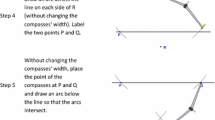Abstract
Many recent models of learning and instruction center learning on real-world tasks and problems to support knowledge application and transfer. Of the many different approaches to centering learning on real-world tasks and problems, one main area in recent literature attempts to balance the efficiency of adequate learner support with the effectiveness of centering learning on real-world tasks. Names for the various models in this area have included problem-centered instruction, cognitive apprenticeship, elaboration theory, and taskcentered learning/instruction. As yet there has not been much comparison or combination of the prescriptions of these task-centered approaches to learning. Therefore we compare and combine several task-centered learning models to outline essential prescriptive elements of a task-centered learning approach.
Similar content being viewed by others
References
Collins, A. M., Brown, J. S., & Holum, A. (1991). Cognitive apprenticeship: Making thinking visible. American Educator, 15(3), 6-11.
Collins, A. M., Brown, J. S., & Newman, S. E. (1989). Cognitive apprenticeship: Teaching the crafts of reading, writing, and mathematics. In L. B. Resnick (Ed.), Knowing, learning, and instruction: Essays in honor of Robert Glaser (pp. 453-494). Mahwah, NJ: Lawrence Erlbaum Associates.
Frick, T., Chadha, R., Watson, C., Wang, Y., & Green, P. (2009). College student perceptions of teaching and learning quality. Educational Technology Research & Development, 57(5), 705-720. doi:10.1007/s11423-007-9079-9
Lim, J., Reiser, R. A., & Olina, Z. (2009). The effects of part-task and whole-task instructional approaches on acquisition and transfer of a complex cognitive skill. Educational Technology Research and Development, 57(1), 61-77.
Merrill, M. D. (2002a). First principles of instruction. Educational Technology Research and Development, 50(3), 43-59.
Merrill, M. D. (2002b). A pebble-in-the-pond model for instructional design. Performance Improvement, 41(7), 39-44.
Merrill, M. D. (2007). A task-centered instructional strategy. Journal of Research on Technology in Education, 40(1), 5-22.
Merrill, M. D., Barclay, M., & van Schaak, A. (2008). Prescriptive principles for instructional design. In J. M. Spector, M. D. Merrill, J. J. G. van Merriënboer, & M. P. Driscoll (Eds.), Handbook of research on educational communications and technology (pp. 173-184). New York, NY: Lawrence Erlbaum Associates.
Reigeluth, C. M. (1999). The elaboration theory: Guidance for scope and sequence decisions. Instructional design theories and models: A new paradigm of instructional theory, 2, 425-453.
Sarfo, F. K., & Elen, J. (2007). Developing technical expertise in secondary technical schools: The effect of 4C/ID learning environments. Learning Environments Research, 10(3), 207-221.
Spector, J. M. (2003). Problems with problem-based learning: Comments on model-centered learning and instruction in Seel (2003). Technology, Instruction, Cognition and Learning, 1(4), 359-374.
Van Merriënboer, J. J. G. (1997). Training complex cognitive skills: A four-component instructional design model for technical training. New Jersey: Educational Technology Publications.
Van Merriënboer, J. J. G., Jelsma, O., & Paas, F. (1992). Training for reflective expertise: A four-component instructional design model for complex cognitive skills. Educational Technology Research and Development, 40(2), 23-43. doi:10.1007/BF02297047
Van Merriënboer, J. J. G., & Kester, L. (2008). Whole-task models in education. In J. M. Spector, M. D. Merrill, J. J. G. van Merriënboer, & M. P. Driscoll (Eds.), Handbook of research on educational communications and technology (pp. 441-456). New York, NY: Lawrence Erlbaum Associates.
Van Merriënboer, J. J. G., & Kirschner, P. A. (2007). Ten steps to complex learning: A systematic approach to four-component instructional design. New Jersey: Lawrence Erlbaum Associates
Author information
Authors and Affiliations
Corresponding author
Rights and permissions
About this article
Cite this article
Francom, G.M., Gardner, J. What is task-centered learning?. TECHTRENDS TECH TRENDS 58, 27–35 (2014). https://doi.org/10.1007/s11528-014-0784-z
Received:
Published:
Issue Date:
DOI: https://doi.org/10.1007/s11528-014-0784-z




